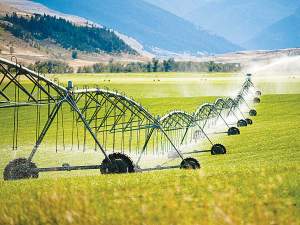Australian teams to help repair North Canterbury irrigators after storm
Moves are afoot to get a team of Australians over here to help repair North Canterbury's irrigation machinery, ravaged by the big windstorm of late October.
 Watermetrics says knowing the moisture in your soil to a good depth is crucial in irrigation decisions.
Watermetrics says knowing the moisture in your soil to a good depth is crucial in irrigation decisions.
Do you know what’s happening in your soil? Water usage and productivity company Watermetrics believes it’s essential for farmers to know this.
The company says a proper soil probe will give farmers accurate information in terms of moisture and temperature.
For example, you can use different forms of nitrogen but it is best not applied when the top 10cm soil temperature is less than 6 degree C.
The company says knowing the moisture in your soil to a good depth is crucial in irrigation decisions. “The more we observe the more confident we are that you can save 20% of your water and still get more growth,” it says.
“You can’t do that without knowing what’s going on in the soil at all levels. Gaining knowledge and understanding of what the best moisture levels are in your soil, you can ensure you are in the best position to get the best growth and take account of seasonal changes.”
Farmers also need to report on nutrient washout and the reasons they irrigated at a certain time.
Watermetrics says this environmental reporting is important and good records satisfy this requirement. An inferior probe will not achieve this.
“The market is full of very ordinary probes, some that have to be dug in, and others give pretty poor information. They do not represent a sound investment. Things like signal cost, frequency of reading, accuracy of probe placement and verification of correct data are important. To do the job properly you need 100mm readings to at least a 500mm depth so you really can see what’s happening.”
They also need connection to a powerful data transfer network. Watermetrics says its Lora network successfully services thousands of farms throughout New Zealand. A recent upgrade has lifted that performance “to world standard data transfer”.
The company says it presents data in meaningful and easy to connect with ways.
“We connect flow data, climate information and soil information in graphical form that makes management decisions easy.”
With spring here, farmers need to make important farm management decisions to make particularly in fertiliser use and irrigation.
“Decisions made now are reflected in your physical and financial performance for the whole year and it’s hard to play catch up for a poor beginning,” it says.
“With dairy the cows have to have good condition by calving and if you do that you can feed them up to maximize the peak of the lactation curve, which is critical in terms of maximising the overall lactation and the amount of solids you have to sell.
“Factors you have to play with are stocking rate, winter grazing, supplement use, nitrogen and irrigation. Best combination of these will give you plenty of feed and with that comes high production and good cow condition going forward.
Budou are being picked now in Bridge Pā, the most intense and exciting time of the year for the Greencollar team – and the harvest of the finest eating grapes is weeks earlier than expected.
The Real Estate Institute of New Zealand (REINZ) has released its latest rural property report, providing a detailed view of New Zealand’s rural real estate market for the 12 months ending December 2025.
Rural retailer Farmlands has released it's latest round of half-year results, labeling it as evidence that its five-year strategy is delivering on financial performance and better value for members.
OPINION: "We are back to where we were a year ago," according to a leading banking analyst in the UK, referring to US president Donald Trump's latest imposition of a global 10% tariff on all exports into the US.
DairyNZ says the Government’s proposed Resource Management Act reform needs further work to ensure it delivers on its intent.
Overseas Trade Minister Todd McClay says he's working constructively with the Labour Party in the hope they will endorse the free trade agreement (FTA) with India when the agreement comes before Parliament for ratification.
OPINION: Expect the Indian free trade deal to feature strongly in the election campaign.
OPINION: One of the world's largest ice cream makers, Nestlé, is going cold on the viability of making the dessert.